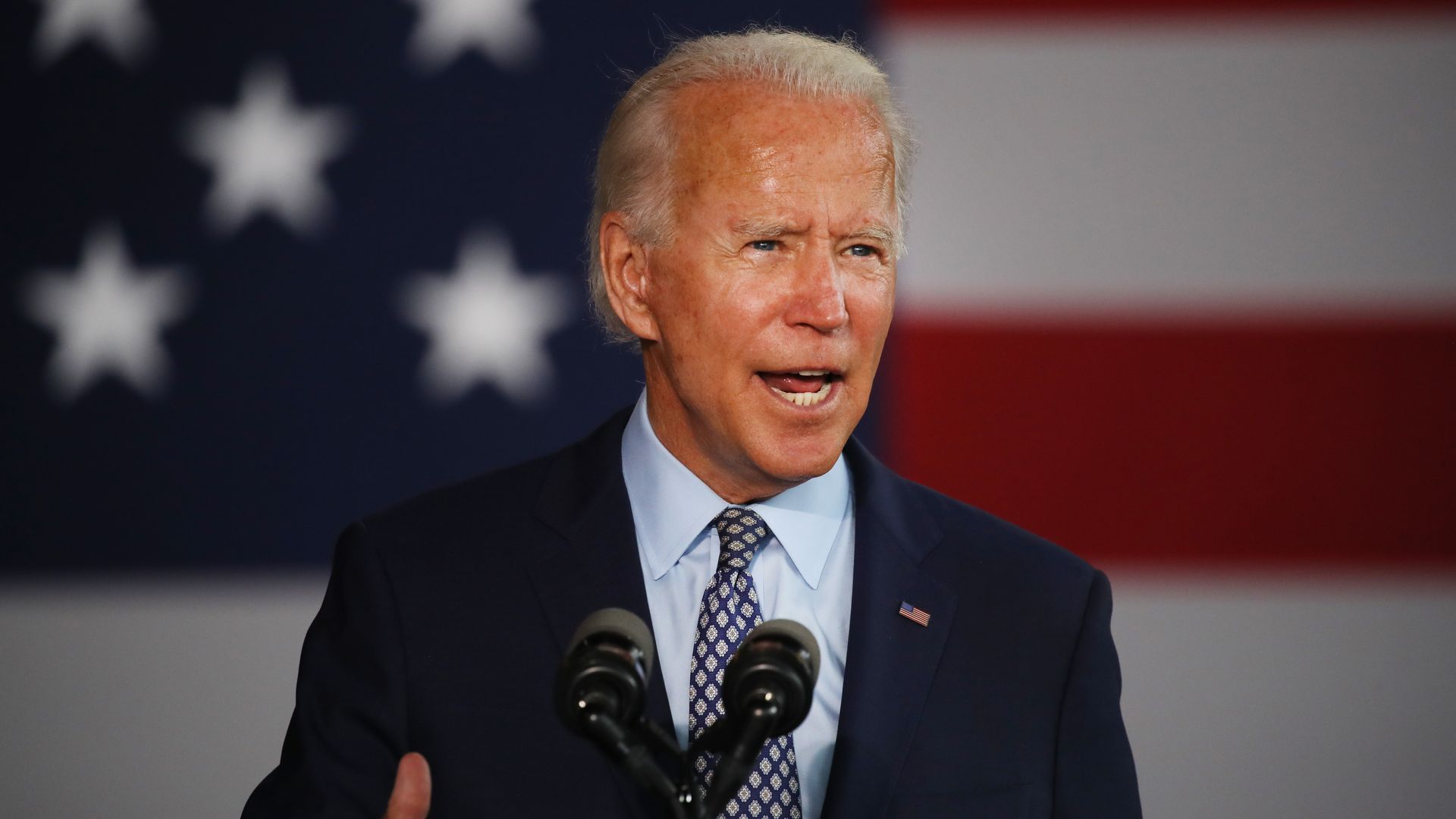The Estate, Legacy and Long-Term Care Planning Center of Western NY
Financial Advisor in Rochester, NY
Election 2020: Joe Biden’s Tax Plans
With the economy in trouble, tax policy takes on added importance in the 2020 presidential election. So, let’s take a look at what Joe Biden has said about taxes.

With COVID-19 dominating the news, it’s sometimes hard to remember that this is also an election year. But we’ll be voting (by mail?) before you know it. That means President Trump and Joe Biden don’t have much time to convince voters that they’re more capable of getting us out of this coronavirus-induced economic mess than the other guy. And, since economic recovery will be front and center during the campaign, we know that tax policy will play a big role in the election, too. After all, any new economic initiatives will have to be paid for somehow, and that usually means tinkering with the tax code.
President Trump hasn’t really talked much about second-term tax proposals. On the other hand, Biden issued several tax policy proposals during the Democratic primaries and has added a few since. Once campaigning heats back up, he’ll have to start promoting – and defending – those proposals again. But until that happens, here’s a look at a few of the higher-profile Biden tax plans concerning hot button issues of the day. (We’ll report on any Trump proposals when they are released.) Start brushing up now, so you’ll know who to vote for in November.
1. Higher Taxes on Wealthier Americans
Unlike some of his opponents in the Democratic primaries (e.g., Elizabeth Warren and Bernie Sanders), Biden has not push for a “wealth tax.” But that doesn’t mean he is opposed to taxing the wealthy more heavily. For instance, to help close the income gap, he wants to raise the highest personal income rate back up to 39.6% (it was lowered to 37% by the 2017 tax reform law), cap itemized deductions for the wealthiest Americans at 28%, limit “like-kind exchanges” by real estate investors, and phase-out the 20% deduction for qualified business income for upper-income taxpayers. He won’t raise taxes for anyone making less than $400,000, though.
The former Vice President has also proposed eliminating the step-up in basis for inherited capital assets, which means more taxes on wealth passed to heirs, and ending favorable tax rates on capital gains for anyone making over $1 million. Also look for the federal estate tax exemption to be increased back to pre-tax reform levels.
2. Tax Breaks for Ordinary Americans

Taxing the wealthy isn’t the only way to narrow the income gap. Reducing taxes for low- and middle-income taxpayers will help that effort, too. Along those lines, Biden has proposed:
1. Expanding the child and dependent care credit to $8,000 per child (up to $16,000), and making it refundable and payable in advance;
2. Forgiving student loan debt and excluding the forgiven amount from taxation;
3. Expanding the work opportunity tax credit to include military spouses;
4. Enhancing tax breaks and access to 401(k) plans for workers who are saving for retirement; and
5. Creating tax credits for small businesses that offer retirement plans for their workers.
3. Stimulus Checks

Biden has mostly remained silent about the tax aspects of economic responses to the coronavirus pandemic. However, he has shown support for additional stimulus check payments for families with dependents aged 17 and older (e.g., high school students or older relatives living with the family). Payments for these people were not included in the CARES Act. He would also advocate for additional cash payments going forward as needed. (Stimulus checks are actually advance payments of a new tax credit available for the 2020 tax year.)
4. Health Care

Biden never jumped on the Medicare-for-all bandwagon. Instead, he would rather keep and improve Obamacare. As part of his plan to do this, he would eliminate the income-based cap on the premium tax credit so that all families who purchase insurance through a health insurance exchange can claim the credit. He would also increase the credit amount by basing it on the cost of a gold-level health plan, rather than a less-expensive silver-level plan. In addition, Biden’s health care plan would impose a tax penalty on pharmaceutical companies that increase drug costs by more than the rate of inflation and take away their deduction for advertising expenses. He also wants to eliminate any tax incentives for pharmaceutical companies to move production overseas.
5. Senior Citizens
Biden has also proposed several tax changes to help senior citizens and those who care for them. First, his plan calls for increased tax benefits for elderly Americans who pay for long-term care insurance with their retirement savings. As president, Biden will also allow low-wage workers over 65 years of age to claim the earned income tax credit (currently, you can’t claim the credit if you’re over 65).
To help protect Social Security, Biden would make more income from wealthier Americans subject to the Social Security payroll tax. For 2020, wages above $137,700 are not subject to the payroll tax (the amount is adjusted annually for inflation). Biden would make wages above $400,000 subject to the tax.
In addition, he would create a $5,000 tax credit for “informal” caregivers—family members or other loved ones—providing long-term care to the elderly. Caregivers would also be allowed to make “catch-up” contributions to retirement accounts.
6. Disabled People

If elected president, Biden will push for increased tax credits for any employer, including small businesses, that hire a person with a disability. The credit would be worth up to a $5,000 the first year and $2,500 if the disabled worker completes a second year of employment. There would also be up to $30,000 in tax credits available to businesses that improve the accessibility of their workplace.
Biden also want to expand access to ABLE accounts. These are tax-advantaged savings accounts that provide people with disabilities a way to pay for qualified disability-related expenses, such as education, housing and transportation. Specifically, Biden would work to pass the ABLE Age Adjustment Act, which he says would make ABLE accounts available to 6 million additional adults with disabilities, including 1 million veterans.
7. Climate Change

Biden has issued a climate change plan that includes some tax provisions. His “Clean Energy Revolution” would be paid for by restoring the full electric vehicle tax credit (while aiming it at middle-class consumers); pushing tax breaks for energy efficiency in the homes and other buildings; and increasing tax incentives for carbon capture, use and storage. He has also separately stated that he would support a carbon tax.
8. Affordable Housing
Biden’s plan to expand access to affordable housing calls for creating a new refundable tax credit of up to $15,000 for first-time homebuyers. The credit would be paid when qualified taxpayers purchase a home, instead of when they file their tax return the following year.
He also wants to enact a new renter’s tax credit to reduce rent and utility costs to 30% of income for low-income individuals. In addition, Biden supports expanding the low-income housing tax credit, which provides incentives for the construction or rehabilitation of affordable housing for low-income tenants.
9. Corporate Taxes
The 2017 tax reform law dropped the corporate income rate from 35% to 21%. Biden wants to raise the rate to 28%. He has also called for a 15% minimum tax on large corporations.
The former Vice President has also called for repeal of the temporary net operating loss (NOL) provisions contained in the CARES Act. That law, which was passed in response to the coronavirus-induced economic meltdown, allows NOLs in 2018, 2019 and 2020 to be carried back for up to five years. It also suspends the 80% taxable income limit for utilizing NOLs for 2018 through 2020.
In addition, Biden wants to increase the global intangible low tax income (GILTI) rate on foreign profits from 10.5% to 21%. He also supports a “claw-back” provision to force companies to return public investments and tax benefits when they close down jobs in the U.S. and send them overseas.
If Biden is elected, look for the pharmaceutical industry to pay more taxes, too. This would include the elimination of tax breaks for prescription drug advertisements and eliminate any tax incentives for pharmaceutical companies to move production overseas.
On the other hand, the industrial sector could see more tax incentives for efficiency upgrades, process changes, and facility retooling. For example, Biden has called for a new manufacturing communities tax credit that would promote revitalizing, renovating, and modernizing existing – or recently closed down – facilities. Projects receiving the credit would have to benefit local workers and communities.
Source: https://www.kiplinger.com/slideshow/taxes/t055-s001-2020-election-joe-biden-s-tax-plans/index.html?rid=EML-tax&rmrecid=3920635532&utm_campaign=20200726-tax&utm_medium=email&utm_source=tax



